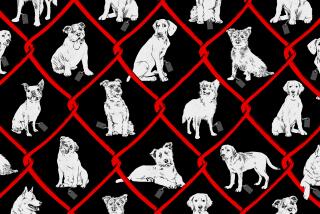Forget the Puppy Prozac: No Pill Can Replace a Guilty Owner as Dog’s Best Friend
- Share via
There is something disturbing about the concept of a doggy antidepressant, such as the drug approved by the FDA last week.
The main feature of the medication, called Clomicalm, is that it purportedly relieves the animal’s separation anxiety. This usually comes on when its human companion (you or I) has the audacity to live his life and leave the home to go to work, the store, a movie or, God forbid, on vacation.
My problem with such a pill has to do with guilt. Or rather a dog’s ability to induce guilt. You owners are familiar with the standard canine repertoire: the long face, the whimpering, the scratching at the front door with leash in mouth, the hunger strike . . .
That Clomicalm could minimize, if not end, such behavior may be welcome news to most people. But to me it is the opposite: It represents a threat to my very way of life.
In order to understand where I’m coming from, you must understand where I come from: an East Coast, Jewish upbringing generously laced with my mother’s multi-mantras, i.e.: “Don’t worry about me--you go out and have your fun”; or, “I don’t need anything for myself--my happiness is watching you be happy. . . .” You get the idea.
Contrary to most textbooks and pop psychologists, however, I posit that a lifetime of guilt is not necessarily bad. After a while, it becomes the basis for many acts of altruism. For instance, I will let an elderly woman ahead of me in the supermarket line because if I don’t, my mother will find out about it and cry (in private, of course).
Or, I give to a charity because if I don’t, my mother will find out about it and cry.
Or, I will give up some of my annual raise so that the reporters I supervise can get a more generous raise because . . . scratch that.
But if one is not careful, time can temper these pangs of guilt. That is where dogs come in handy. Next to Jewish mothers, they are perhaps the most accomplished purveyors of guilt on this planet.
First of all, we all know that with a few unfortunate exceptions, our dogs will die before we do. So it is incumbent upon us humans to make life as fulfilling and comforting for them as possible. (In fact, most of my happiness comes from watching my dog be happy.)
But more directly, dogs can manipulate their expression and body posture to rival any chicken soup-toting yenta. Take our golden retriever, Sunshine. Please.
Sunshine has a potent arsenal of guilt strategies, including:
* Nudging me awake for a bathroom break at 5 a.m.; then, when I stagger up to put on my slippers, leaping into my spot in bed and pretending to fall immediately asleep.
* Collapsing into an inconsolable heap as soon as it becomes clear that we humans are leaving the house without him.
* Refusing to venture even into his own backyard by himself, instead waiting forlornly for his humans to chaperon.
* Holding out for Hebrew National hot dogs, before finally settling for dog food. Much of the time, his holdouts pay off.
My previous dog, Woody (featured posthumously on these pages a few years ago), was shameless. Once, I kept him with friends at their farmhouse while I went on a nine-month fellowship. He had it all during that time--acres to roam, rabbits to chase. But when I returned, he refused to look at me for weeks, staring straight ahead, expressionless. The resulting guilt motivated me to give him all sorts of perks--including an all-expenses-paid vacation to Martha’s Vineyard.
In addition, he routinely feigned illness while my wife and I were away on trips. Dog-sitters would call and beckon us home because they were sure Woody was “dying.” We fell for it half a dozen times before it dawned on us that Woody’s miraculous, spontaneous recoveries as soon as we returned were, in fact, a sham.
My point is that if we start giving dogs pills to eliminate such behavior, what will become of the human-dog relationship?
I’ll tell you what: They will start eating dog food, staying out in the yard by themselves, eschewing the leash and sleeping on the floor.
Is this what we really want?
Most of all, they will lose the look. I had always thought that animals were loath to look people straight in the eye. But not my dogs (with the exception of Woody’s post-fellowship behavior, of course).
Sunshine makes a point of insinuating himself about 3 inches from my face (he’s up on his hind legs at this point, paws placed gently in my hands) and staring me down.
The look says it all: “You go have your fun--I’ll be fine.” . . . “Your happiness is my happiness.” . . . “I’m just a dog.”
“Doggy Prozac” could eliminate all that.
It portends leisurely, uninterrupted evenings of reading, void of metronomic whimpering by the door; eating a meal without huddling over it in an isolated corner of the kitchen as if to hide it from my starving dog; sleeping without hands clenched as I wait for 80 pounds of pure neurosis to land on my midsection without notice.
Indeed, it could mean the end of guilt as we know it.
Whatever makes you happy . . .






